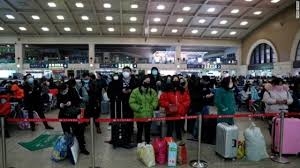US and Australia close borders to Chinese arrivals
Countries around the world have closed their borders to arrivals from China, as officials work to control the rapid spread of the coronavirus.
The US and Australia said they would deny entry to all foreign visitors who had recently been in China, where the virus first emerged in December.
Earlier, countries including Russia, Japan, Pakistan and Italy announced similar travel restrictions.
But global health officials have advised against such measures.
"Travel restrictions can cause more harm than good by hindering info-sharing, medical supply chains and harming economies," the head of the World Health Organization (WHO) said on Friday.
The WHO recommends introducing screening at official border crossings. It has warned that closing borders could accelerate the spread of the virus, with travellers entering countries unofficially.
- Can people recover from coronavirus? And other questions
- How quarantine has fought disease through the ages
- The lessons learned from the Sars outbreak
China has criticised the wave of travel restrictions, accusing foreign governments of ignoring official advice.
"Just as the WHO recommended against travel restrictions, the US rushed in the opposite direction," foreign ministry spokeswoman Hua Chunying said. "[It is] certainly not a gesture of goodwill."
What is the latest?
The death toll from the new virus, which is officially called 2019-nCov, now stands at 259.
All the deaths occurred within China and the majority were in Hubei province, where the virus originated.
Almost 12,000 cases have been confirmed and a small proportion of those - around 100 - occurred outside China. The UK, US, Russia and Germany have all confirmed cases in recent days.
The number of coronavirus cases worldwide has overtaken that of the similar Sars epidemic, which spread to more than two dozen countries in 2003.
But the mortality rate of the new virus is much lower than that of Sars, which has led officials to believe it is not as deadly.
Estimates by the University of Hong Kong suggest the total number of cases could be far higher than official figures suggest. More than 75,000 people may have been infected in the city of Wuhan, which is at the epicentre of the outbreak, experts say.
Related Posts

